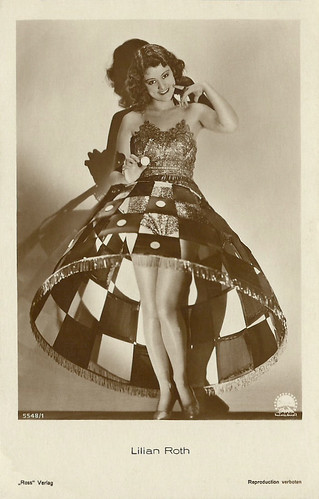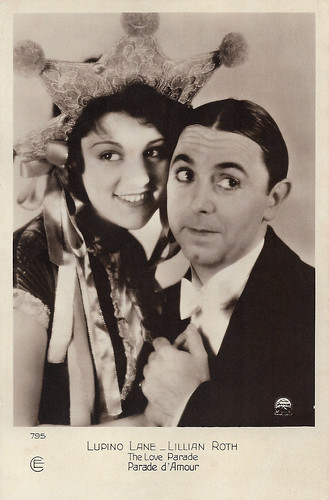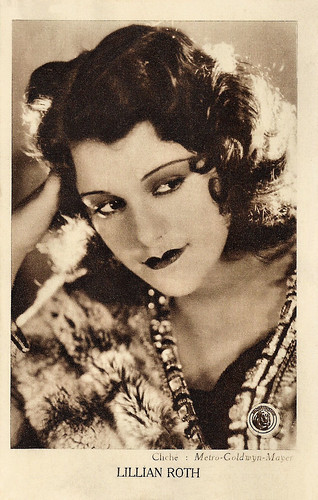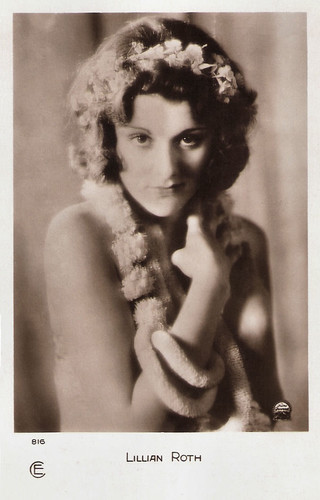American singer and actress Lillian Roth (1910-1980) was a Broadway star and Hollywood actress. Among her films were Ernst Lubitsch's The Love Parade (1929), Cecil B. DeMille's Madam Satan (1930), and the Marx Brothers' second film, Animal Crackers (1930). She rebelled against the pressure of her domineering stage mother and reacted to the death of her fiance by becoming an alcoholic. After a 16-year struggle with alcoholism she made a remarkable return to stardom. Her life story was told in the biopic I'll Cry Tomorrow (1955) starring Susan Hayward.

German postcard by Ross Verlag, no. 5548/1, 1930-1931. Photo: Paramount. Collection: Didier Hanson.
Lillian Roth was born Lillian Rutstein in Boston, Massachusetts, in 1910. She was the daughter of Katie (née Silverman) and Arthur Rutstein. She had a younger sister, Anne, and the family was Jewish.
She was given her first name in honor of singer Lillian Russell. Her daunting stage parents groomed Lillian and Anne for stardom at an early age. In 1916, when Lillian was five and Anne three, the family moved to New York City to be near the various casting offices. Her mother took her to Educational Pictures, a major film distribution company, where she became the company's trademark, symbolised by a living statue holding a lamp of knowledge. In her autobiographical book, I’ll Cry Tomorrow, she writes of being molested by the artist that was hired to create the logo.
Lillian attended the Professional Children’s School with classmates Ruby Keeler and Milton Berle. In 1917, the six-year-old made her Broadway debut in The Inner Man, a production of the famous Shubert brothers, who are responsible for the establishment of Broadway as the hub of the theatre industry in the United States. Her film debut came as an extra in Pershing's Crusaders (1918), a semi-documentary on American troops in France in the First World War. She was rewarded with casting in another Shubert production called Shaving with the billing 'Broadway's Youngest Star.'
Throughout her childhood Roth’s father’s alcoholism resulted in his periodic lengthy separations from the family. As a result, her ambitious mother molded her and her younger sister Anne into vaudeville headliners billed as 'Lillian Roth and Co.' or 'The Roth Kids'. A vaudeville tour on the Keith-Orpheum circuit, a chain of vaudeville and movie theatres, made both of the girl's famous. Her theme song became 'When the Red, Red Robin (Comes Bob, Bob, Bobbin' Along)'.
One of the most exciting moments for her came when she met U.S. President Woodrow Wilson. The President and Mrs Wilson attended their vaudeville act in Washington D.C. According to her autobiography, the enamoured president took Lillian and her sister for a ride around the block in his open touring car.
She appeared in Artists and Models in 1923, but was soon transferred to the Chicago company of the show because New York legal authorities considered her too young to be in a 'risqué' show. She went on to make Revels with Frank Fay. During production for the show, she told management she was 19 years of age despite being only 13 at the time.
In 1927, when Roth was 17, she made the first of three Earl Carroll Vanities. She enhanced her image as a wild party girl and flapper and she introduced the ribald song Drizzle, Drizzle, The Party's a Fizzle, O! What A Night to Love'. This was soon followed by a leading role in Midnight Frolics, a Florenz Ziegfeld production. Variety and New York City newspapers praised Roth’s singing voice and stage personality. Her next step was to go to Hollywood...

French postcard by Cinémagazine-Edition (CE), Paris, no. 795. Photo: Paramount. Publicity still for The Love Parade (Ernst Lubitsch, 1929) with Lupino Lane.
In 1929, Lillian Roth signed a seven-year contract with Paramount Pictures. Her film career coincided with the beginning of the sound film. First she appeared as Lulu in Ernst Lubitsch's musical comedy The Love Parade (Ernst Lubitsch, 1929) starring Maurice Chevalier and Jeanette MacDonald. Lubitsch's first sound film was a huge box-office hit.
Then she played another supporting role in the Operetta The Vagabond King (Ludwig Berger, 1930) which was photographed entirely in two-colour Technicolor. The film told the story of the renegade French poet François Villon, played by Dennis King. The film was nominated for an Academy Award for Best Art Direction. Then followed the all-star revue Paramount on Parade (1930), directed by several directors including Edmund Goulding, Dorothy Arzner, and Ernst Lubitsch, and Honey (Wesley Ruggles, 1930) in which she introduced her signature song 'Sing, You Sinners'.
A curiosity is the musical extravaganza Madam Satan (Cecil B. DeMille, 1930) with Reginald Denny and Kay Johnson. According to Wikipedia it is "one of the oddest films DeMille made and certainly one of the oddest MGM made during its 'golden age'." Thematically, DeMille attempted to return to the boudoir comedies genre that had brought him success at the box office 10 years earlier.
Roth also appeared in Sea Legs (Victor Heerman, 1930) with Jack Oakie, and in Animal Crackers (Victor Heerman, 1930) the second film of the Marx Brothers. In this comedy mayhem and zaniness ensue when a valuable painting goes missing during a party in honour of famed African explorer Captain Jeffrey T. Spaulding (Groucho Marx). It was a critical and commercial success.
Tings seemed to be running smoothly for her. Then the sudden death of her fiance David Lyons, who died of tuberculosis, drove Lillian into deep despair. She found liquor to be a calming sensation, which led in the following years to a full-scale addiction.
She took over Ethel Merman's stage role in the film version of Take a Chance (Monte Brice, Laurence Schwab, 1933), singing 'Eadie Was a Lady'. After leaving Paramount, she had a supporting role at Warner Bros. in the women's prison film Ladies They Talk About (Howard Bretherton, William Keighley, 1933) with Barbara Stanwyck.

Dutch postcard by N.V. De Faam, Breda. Photo: Metro-Goldwyn-Mayer. Publicity still for Madam Satan (Cecil B. DeMille, 1930).
Lilian Roth headlined the Palace Theatre in New York City and performed in the Earl Carroll Vanities in 1928, 1931, and 1932. She continued to make strides as a singer in an era when so much was being set to music.
By the end of the 1930s, her career was over and she disappeared from the theatre scene. Her private life was in scrambles decimated by alcoholism. She acknowledged that she had earned over one million dollars, and lost it all. Lillian with suicidal tendencies, became a common drunk which led to failed marriages. In 1945, she committed herself to a New York mental institution, but the treatment did not provide a permanent cure for her illness. Finally, her friends and Alcoholic Anonymous were her salvation.
In the late 1940s she reemerged as a singer again doing club work. A sober Lillian appeared across the country and then Australian and New Zealand. She returned again to Hollywood with a successful booking at Ciro's. In 1953, she appeared on a special episode of the TV series This Is Your Life with Ralph Edwards. In response to her honesty in relating her story of alcoholism, she received more than 40,000 letters.
This overwhelming response encouraged her to write her autobiography, which described open and touchingly her struggle against alcoholism and mental illness. I'll Cry Tomorrow, written with author-collaborators Mike Connolly and Gerald Frank, was an instant sensation, selling more than 100,000 copies in a few months. A toned-down version of it was made into the hit film I'll Cry Tomorrow (Daniel Mann, 1955) with Susan Hayward, who was nominated for an Oscar and won the Best Actress award at the Cannes Film Festival. The book would sell worldwide more than seven million copies in twenty languages, and the film renewed the public interest in Roth.
In 1958, Lillian Roth published a second book, Beyond My Worth. Roth had managed to re-invent herself as a major concert and nightclub performer. She appeared at venues in Las Vegas and New York's Copacabana and was a popular attraction in Australia.
In 1962, she was featured as Elliott Gould's mother in the Broadway musical I Can Get It for You Wholesale, in which Barbra Streisand made her Broadway debut. Despite the acclaim for Streisand, producer David Merrick realised that Roth's name still sold tickets, and he elevated her to above-title star billing after the show's opening, with Gould, Streisand, and Sheree North listed below. Roth remained with the show for its full run of 301 performances and recorded the cast album for Columbia Records. She was also featured as Mrs. Brice in the national touring company of Funny Girl in 1964, again getting top billing.
Roth was married five times: to aviator William C. Scott, New York Judge Benjamin Shalleck, Eugene J. Weiner, Edward Goldman, and Thomas Burt McGuire. She divorced her first husband in 1932 after 13 months of marriage.
Roth met her last husband, Thomas Burt McGuire, scion of Funk and Wagnalls Publishing Company at an Alcoholics Anonymous meeting (Roth joined Alcoholics Anonymous in 1946). The Catholic McGuire affected her in such a way both spiritually and emotionally that Roth converted to Catholicism in 1948. The two wed and McGuire managed Roth until September 1963, when she received a note from him stating that their marriage was finished. McGuire left Roth for another man and according to Roth, after withdrawing all funds from their joint bank account.
Roth returned to Broadway in 1971 in the John Kander and Fred Ebb musical 70, Girls, 70, which had a short run. She played a pathologist in the horror film Alice, Sweet Alice/Communion (Alfred Sole, 1976), Brooke Shields' feature film debut. Her last film was Boardwalk (Stephen Verona, 1979), with Lee Strasberg, Ruth Gordon, and Janet Leigh. In 1980, Lillian Roth died from a stroke in New York City. She was 69. The inscription on her marker in Mount Pleasant Cemetery in Westchester County, New York reads: 'As bad as it was it was good.'
At The American Vaudeville, Klaudia Kendall writes: "Roth was representative of the aesthetics of the tail-end of the Jazz age, with her vampire makeup, pale skin, and dark hair. As a performer, Roth blurred the lines between a comedienne and a serious actress, and expanded her use of humor and hardships into her biography while simultaneously using her stardom as an outlet to help those affected by alcoholism and to spread awareness about the destructive nature that the substance had on her own life. Although Roth was subject to both physical and emotional hardship in her career as a vaudeville star, she has remained in the public’s memory as both an advocate for the previously unheard, a beauty, a star in her own right and a woman of mystery."

French postcard by Cinémagazine-Edition (CE), Paris, no. 816. Photo: Paramount. Publicity still for Take a Chance (Monte Brice, Laurence Schwab, 1933).
Sources: Klaudia Kendall (The American Vaudeville), Donald Greyfield (Find A Grave), Gary Brumburgh (IMDb), Bonnie Rothbart Stark (Jewish Women's Archive), Barron H. Lerner (The New York Times), Wikipedia and IMDb.

German postcard by Ross Verlag, no. 5548/1, 1930-1931. Photo: Paramount. Collection: Didier Hanson.
Taken for a ride by the president
Lillian Roth was born Lillian Rutstein in Boston, Massachusetts, in 1910. She was the daughter of Katie (née Silverman) and Arthur Rutstein. She had a younger sister, Anne, and the family was Jewish.
She was given her first name in honor of singer Lillian Russell. Her daunting stage parents groomed Lillian and Anne for stardom at an early age. In 1916, when Lillian was five and Anne three, the family moved to New York City to be near the various casting offices. Her mother took her to Educational Pictures, a major film distribution company, where she became the company's trademark, symbolised by a living statue holding a lamp of knowledge. In her autobiographical book, I’ll Cry Tomorrow, she writes of being molested by the artist that was hired to create the logo.
Lillian attended the Professional Children’s School with classmates Ruby Keeler and Milton Berle. In 1917, the six-year-old made her Broadway debut in The Inner Man, a production of the famous Shubert brothers, who are responsible for the establishment of Broadway as the hub of the theatre industry in the United States. Her film debut came as an extra in Pershing's Crusaders (1918), a semi-documentary on American troops in France in the First World War. She was rewarded with casting in another Shubert production called Shaving with the billing 'Broadway's Youngest Star.'
Throughout her childhood Roth’s father’s alcoholism resulted in his periodic lengthy separations from the family. As a result, her ambitious mother molded her and her younger sister Anne into vaudeville headliners billed as 'Lillian Roth and Co.' or 'The Roth Kids'. A vaudeville tour on the Keith-Orpheum circuit, a chain of vaudeville and movie theatres, made both of the girl's famous. Her theme song became 'When the Red, Red Robin (Comes Bob, Bob, Bobbin' Along)'.
One of the most exciting moments for her came when she met U.S. President Woodrow Wilson. The President and Mrs Wilson attended their vaudeville act in Washington D.C. According to her autobiography, the enamoured president took Lillian and her sister for a ride around the block in his open touring car.
She appeared in Artists and Models in 1923, but was soon transferred to the Chicago company of the show because New York legal authorities considered her too young to be in a 'risqué' show. She went on to make Revels with Frank Fay. During production for the show, she told management she was 19 years of age despite being only 13 at the time.
In 1927, when Roth was 17, she made the first of three Earl Carroll Vanities. She enhanced her image as a wild party girl and flapper and she introduced the ribald song Drizzle, Drizzle, The Party's a Fizzle, O! What A Night to Love'. This was soon followed by a leading role in Midnight Frolics, a Florenz Ziegfeld production. Variety and New York City newspapers praised Roth’s singing voice and stage personality. Her next step was to go to Hollywood...

French postcard by Cinémagazine-Edition (CE), Paris, no. 795. Photo: Paramount. Publicity still for The Love Parade (Ernst Lubitsch, 1929) with Lupino Lane.
One of the oddest films made
In 1929, Lillian Roth signed a seven-year contract with Paramount Pictures. Her film career coincided with the beginning of the sound film. First she appeared as Lulu in Ernst Lubitsch's musical comedy The Love Parade (Ernst Lubitsch, 1929) starring Maurice Chevalier and Jeanette MacDonald. Lubitsch's first sound film was a huge box-office hit.
Then she played another supporting role in the Operetta The Vagabond King (Ludwig Berger, 1930) which was photographed entirely in two-colour Technicolor. The film told the story of the renegade French poet François Villon, played by Dennis King. The film was nominated for an Academy Award for Best Art Direction. Then followed the all-star revue Paramount on Parade (1930), directed by several directors including Edmund Goulding, Dorothy Arzner, and Ernst Lubitsch, and Honey (Wesley Ruggles, 1930) in which she introduced her signature song 'Sing, You Sinners'.
A curiosity is the musical extravaganza Madam Satan (Cecil B. DeMille, 1930) with Reginald Denny and Kay Johnson. According to Wikipedia it is "one of the oddest films DeMille made and certainly one of the oddest MGM made during its 'golden age'." Thematically, DeMille attempted to return to the boudoir comedies genre that had brought him success at the box office 10 years earlier.
Roth also appeared in Sea Legs (Victor Heerman, 1930) with Jack Oakie, and in Animal Crackers (Victor Heerman, 1930) the second film of the Marx Brothers. In this comedy mayhem and zaniness ensue when a valuable painting goes missing during a party in honour of famed African explorer Captain Jeffrey T. Spaulding (Groucho Marx). It was a critical and commercial success.
Tings seemed to be running smoothly for her. Then the sudden death of her fiance David Lyons, who died of tuberculosis, drove Lillian into deep despair. She found liquor to be a calming sensation, which led in the following years to a full-scale addiction.
She took over Ethel Merman's stage role in the film version of Take a Chance (Monte Brice, Laurence Schwab, 1933), singing 'Eadie Was a Lady'. After leaving Paramount, she had a supporting role at Warner Bros. in the women's prison film Ladies They Talk About (Howard Bretherton, William Keighley, 1933) with Barbara Stanwyck.

Dutch postcard by N.V. De Faam, Breda. Photo: Metro-Goldwyn-Mayer. Publicity still for Madam Satan (Cecil B. DeMille, 1930).
As bad as it was it was good
Lilian Roth headlined the Palace Theatre in New York City and performed in the Earl Carroll Vanities in 1928, 1931, and 1932. She continued to make strides as a singer in an era when so much was being set to music.
By the end of the 1930s, her career was over and she disappeared from the theatre scene. Her private life was in scrambles decimated by alcoholism. She acknowledged that she had earned over one million dollars, and lost it all. Lillian with suicidal tendencies, became a common drunk which led to failed marriages. In 1945, she committed herself to a New York mental institution, but the treatment did not provide a permanent cure for her illness. Finally, her friends and Alcoholic Anonymous were her salvation.
In the late 1940s she reemerged as a singer again doing club work. A sober Lillian appeared across the country and then Australian and New Zealand. She returned again to Hollywood with a successful booking at Ciro's. In 1953, she appeared on a special episode of the TV series This Is Your Life with Ralph Edwards. In response to her honesty in relating her story of alcoholism, she received more than 40,000 letters.
This overwhelming response encouraged her to write her autobiography, which described open and touchingly her struggle against alcoholism and mental illness. I'll Cry Tomorrow, written with author-collaborators Mike Connolly and Gerald Frank, was an instant sensation, selling more than 100,000 copies in a few months. A toned-down version of it was made into the hit film I'll Cry Tomorrow (Daniel Mann, 1955) with Susan Hayward, who was nominated for an Oscar and won the Best Actress award at the Cannes Film Festival. The book would sell worldwide more than seven million copies in twenty languages, and the film renewed the public interest in Roth.
In 1958, Lillian Roth published a second book, Beyond My Worth. Roth had managed to re-invent herself as a major concert and nightclub performer. She appeared at venues in Las Vegas and New York's Copacabana and was a popular attraction in Australia.
In 1962, she was featured as Elliott Gould's mother in the Broadway musical I Can Get It for You Wholesale, in which Barbra Streisand made her Broadway debut. Despite the acclaim for Streisand, producer David Merrick realised that Roth's name still sold tickets, and he elevated her to above-title star billing after the show's opening, with Gould, Streisand, and Sheree North listed below. Roth remained with the show for its full run of 301 performances and recorded the cast album for Columbia Records. She was also featured as Mrs. Brice in the national touring company of Funny Girl in 1964, again getting top billing.
Roth was married five times: to aviator William C. Scott, New York Judge Benjamin Shalleck, Eugene J. Weiner, Edward Goldman, and Thomas Burt McGuire. She divorced her first husband in 1932 after 13 months of marriage.
Roth met her last husband, Thomas Burt McGuire, scion of Funk and Wagnalls Publishing Company at an Alcoholics Anonymous meeting (Roth joined Alcoholics Anonymous in 1946). The Catholic McGuire affected her in such a way both spiritually and emotionally that Roth converted to Catholicism in 1948. The two wed and McGuire managed Roth until September 1963, when she received a note from him stating that their marriage was finished. McGuire left Roth for another man and according to Roth, after withdrawing all funds from their joint bank account.
Roth returned to Broadway in 1971 in the John Kander and Fred Ebb musical 70, Girls, 70, which had a short run. She played a pathologist in the horror film Alice, Sweet Alice/Communion (Alfred Sole, 1976), Brooke Shields' feature film debut. Her last film was Boardwalk (Stephen Verona, 1979), with Lee Strasberg, Ruth Gordon, and Janet Leigh. In 1980, Lillian Roth died from a stroke in New York City. She was 69. The inscription on her marker in Mount Pleasant Cemetery in Westchester County, New York reads: 'As bad as it was it was good.'
At The American Vaudeville, Klaudia Kendall writes: "Roth was representative of the aesthetics of the tail-end of the Jazz age, with her vampire makeup, pale skin, and dark hair. As a performer, Roth blurred the lines between a comedienne and a serious actress, and expanded her use of humor and hardships into her biography while simultaneously using her stardom as an outlet to help those affected by alcoholism and to spread awareness about the destructive nature that the substance had on her own life. Although Roth was subject to both physical and emotional hardship in her career as a vaudeville star, she has remained in the public’s memory as both an advocate for the previously unheard, a beauty, a star in her own right and a woman of mystery."

French postcard by Cinémagazine-Edition (CE), Paris, no. 816. Photo: Paramount. Publicity still for Take a Chance (Monte Brice, Laurence Schwab, 1933).
Sources: Klaudia Kendall (The American Vaudeville), Donald Greyfield (Find A Grave), Gary Brumburgh (IMDb), Bonnie Rothbart Stark (Jewish Women's Archive), Barron H. Lerner (The New York Times), Wikipedia and IMDb.
No comments:
Post a Comment